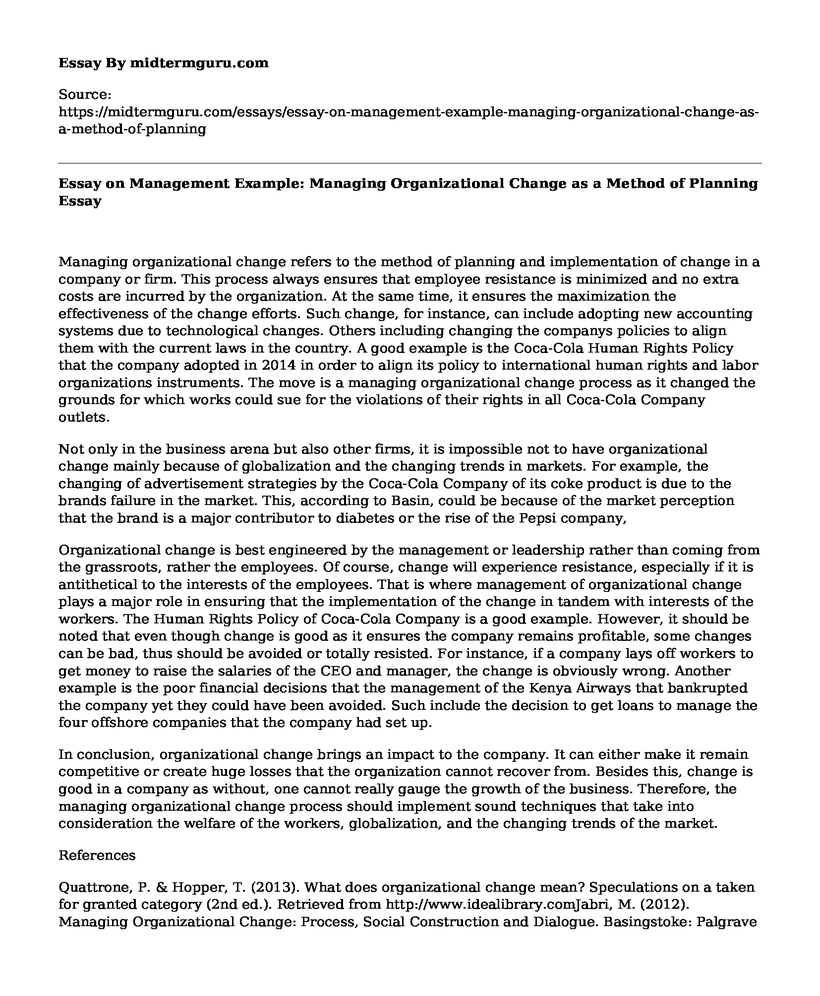Managing organizational change refers to the method of planning and implementation of change in a company or firm. This process always ensures that employee resistance is minimized and no extra costs are incurred by the organization. At the same time, it ensures the maximization the effectiveness of the change efforts. Such change, for instance, can include adopting new accounting systems due to technological changes. Others including changing the companys policies to align them with the current laws in the country. A good example is the Coca-Cola Human Rights Policy that the company adopted in 2014 in order to align its policy to international human rights and labor organizations instruments. The move is a managing organizational change process as it changed the grounds for which works could sue for the violations of their rights in all Coca-Cola Company outlets.
Not only in the business arena but also other firms, it is impossible not to have organizational change mainly because of globalization and the changing trends in markets. For example, the changing of advertisement strategies by the Coca-Cola Company of its coke product is due to the brands failure in the market. This, according to Basin, could be because of the market perception that the brand is a major contributor to diabetes or the rise of the Pepsi company,
Organizational change is best engineered by the management or leadership rather than coming from the grassroots, rather the employees. Of course, change will experience resistance, especially if it is antithetical to the interests of the employees. That is where management of organizational change plays a major role in ensuring that the implementation of the change in tandem with interests of the workers. The Human Rights Policy of Coca-Cola Company is a good example. However, it should be noted that even though change is good as it ensures the company remains profitable, some changes can be bad, thus should be avoided or totally resisted. For instance, if a company lays off workers to get money to raise the salaries of the CEO and manager, the change is obviously wrong. Another example is the poor financial decisions that the management of the Kenya Airways that bankrupted the company yet they could have been avoided. Such include the decision to get loans to manage the four offshore companies that the company had set up.
In conclusion, organizational change brings an impact to the company. It can either make it remain competitive or create huge losses that the organization cannot recover from. Besides this, change is good in a company as without, one cannot really gauge the growth of the business. Therefore, the managing organizational change process should implement sound techniques that take into consideration the welfare of the workers, globalization, and the changing trends of the market.
References
Quattrone, P. & Hopper, T. (2013). What does organizational change mean? Speculations on a taken for granted category (2nd ed.). Retrieved from http://www.idealibrary.comJabri, M. (2012). Managing Organizational Change: Process, Social Construction and Dialogue. Basingstoke: Palgrave Macmillan
Nganga, C. (2014). Coca-Cola Company. History, SWOT analysis, marketing strategies. Munchen: GRIN Verlag GmbH
Nelson, D. L., & Quick, J. C. (2012). Organizational behavior: Science, the real world, and you. Mason, Ohio: South-Western.
Okoth, E. (2015). Why Kenya Airways made Sh26bn loss. The Daily Nation. Retrieved from http://www.nation.co.ke/news/Why-Kenya-Airways-made-Sh26bn-loss/1056-2818612-12bwmno/index.html
Cite this page
Essay on Management Example: Managing Organizational Change as a Method of Planning. (2021, May 28). Retrieved from https://midtermguru.com/essays/essay-on-management-example-managing-organizational-change-as-a-method-of-planning
If you are the original author of this essay and no longer wish to have it published on the midtermguru.com website, please click below to request its removal:
- Leadership Stories: Abdullah, the King of Arabia
- Simulation of Faboulous Four Company - Paper Example
- Group Discussion and Presentation Reflection Essay
- Essay Sample on Business Management: Law and Strategy Concept
- Paper Example on Human Motivation
- Physiological Needs for Employee Well-Being and Performance - Essay Sample
- Leadership: Working Hard to Empower Others Towards Goals - Essay Sample







